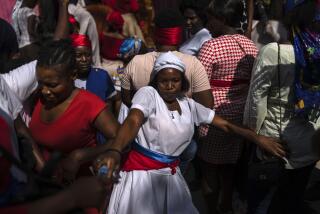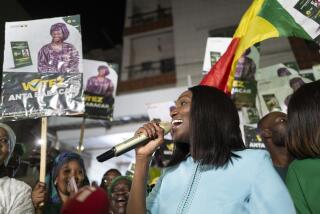COLUMN ONE : Africa’s Holy Men of Politics : Senegal’s marabout religious leaders wield unique secular authority. But this is beginning to strain relations with their followers.
- Share via
TOUBA, Senegal — From a dusty roundabout 100 miles or so from the coast of West Africa, an immense white minaret beckons in the haze. A gendarme clad in khaki approaches a visitor’s car.
“No cigarettes? No alcohol?” he asks.
Satisfied that the occupants had left any such contraband behind, he waved them on--and they proceeded into one of the most extraordinary cities in Africa.
This is Touba, a combination Vatican City and Mecca for the millions of followers of the Islamic Mouride Brotherhood, perhaps the most politically potent of the traditional organizations in Africa.
It is here that the sect safeguards the writings of its founder, the sainted Amadou Bamba. Across the street from the Touba mosque, whose minaret is the tallest in black Africa, a thriving agricultural and trading enterprise is centralized under the umbrella of the vast religious brotherhood.
Touba is a sort of state within a state. Senegal’s police and customs officers have little or no authority here, and it is said that making the Grand Magal, or annual pilgrimage, to Touba is the next best thing to going to Mecca. Last October, more than a million Mourides clogged the roads into the city for the event.
In a bare room in his family compound just outside the city, Sheik Abdou Kadre Mbacke, the caliph general of the Mourides and the oldest surviving son of Amadou Bamba, fingers the folds of his embroidered orange scarf and the scent of sweet perfume wafts across the air.
“I am not here for politics but to provide spiritual guidance,” he said.
Modest words. The caliph general is one of the most important of the marabouts, the religious leaders who exercise spiritual and secular authority unmatched by traditional leaders elsewhere in Africa.
Virtually every African country retains the vestiges of the ancient kingdoms and principalities that were the political and religious jurisdictions of pre-colonial times. But everywhere else the traditional authorities have either disappeared or been reduced to cat’s-paws of powerful central governments.
In Nigeria, for example, when a vacancy arose last year in its most important traditional seat, the Sultanate of Sokoto, President Ibrahim Babangida stage-managed the succession in order to place his own candidate in the post. Then he restricted the new sultan to his palace, lest he exacerbate Muslim-Christian tension in the disputatious country.
Nothing like that happens in Senegal, where political authority tends to flow the other way. The marabouts exercise power as heads of the predominantly Muslim country’s many brotherhoods, or confreries . It is a rare Senegalese who does not identify himself as a disciple of one or another of these religious groups.
Politicians prepare for elections by making a pilgrimage to key marabouts, all of whom live in remote rural districts. Those in power make sure the brotherhoods’ secular needs are met in return for political support.
How this works was illustrated in 1988 when President Abdou Diouf faced a stiff challenge from opposition candidate Abdoulaye Wade. Even though Wade was a Mouride and Diouf was not, the Mouride caliph general went on radio to warn followers that any who did not vote for Diouf’s reelection would “not come face to face” with the sect’s sainted founder in the afterlife.
Diouf won handily. (The caliph died last year and was succeeded by his oldest surviving brother, Sheik Abdou Kadre.)
Some observers think the marabouts might function as obstacles to the rise here of Islamic fundamentalism, in part because their influence over the country, which is 90% Muslim, is so extensive.
“The fundamentalists are merely intellectuals,” Babacar Toure, publisher of the weekly journal Sud-Hebdo, told a recent visitor. “The marabout is a cultural and intellectual institution. The brotherhoods will be the gravediggers of any fundamentalist attempt to gain power here.”
Any battle between the two forces would be a bitter one. Fundamentalists disapprove of the worldliness of Mouride and other marabouts, as well as the extent to which they exploit their followers’ labor on their personal farms and extract personal gifts.
They also disapprove of some of the beliefs that Bamba has spawned. Experts say that Bamba’s writings are an unremarkable digest of orthodox Islamic beliefs but that the cult that has grown around him is something else.
It is a rare Mouride who cannot recite legends such as the one about Bamba surviving a long period in a cell with a hungry lion. It is said that after he was refused permission to pray by the captain of the French ship taking him to political exile in Gabon in 1895, he flung his prayer mat overboard and prayed atop the waves.
In any case, fundamentalism has been kept at bay in Senegal, at least as far as the brotherhoods are concerned.
When the matter was raised with Alioune Ndaw, director of the Touba library, he asserted: “How many fundamentalists are there in the country? Maybe just three or four.”
The brotherhoods’ importance in Senegalese life is rooted in the land’s colonial history. When the French destroyed the native Wolof kingdoms in the late 19th Century, they extinguished a social and economic structure, leaving a gap that was filled by the brotherhoods.
And the brotherhoods offered more than religious succor. In time, they began to offer security as well. One worked for or presented gifts to one’s marabout; in return, the marabout provided financial assistance at times of sickness or poverty.
The marabouts’ authority was not lost on the French, who turned to them for assistance in running their new colony. In the 1950s, the marabouts helped Leopold Sedar Senghor, a Roman Catholic, to win in the fierce infighting that characterized Senegalese politics just before independence. Senghor led the country until he retired in 1980.
Of Senghor’s supporters, perhaps the most important were the Mourides. In Senegal, no other brotherhood approaches their level of influence. They are not the biggest brotherhood, or the oldest. The Tidjiane and Qadiriyya have twice as many followers and trace their history to ancient times, while Amadou Bamba died in 1927.
But individually and collectively, the Mourides are the richest and most dynamic. Followers of Mouridism trace their spirit of enterprise directly to Bamba, who is said to have greeted new disciples with the simple directive, “Go and work.”
Today they dominate the country’s transport industry--it is a rare bus or bush taxi that is not decorated with the word Touba or a drawing of a minaret--along with the urban real estate business and the largest market in Dakar. The peanut industry, until recently Senegal’s No. 1 export earner, is largely in Mouride hands.
The Mourides’ dabblings in politics have also paid off. Mouride marabouts control considerable patronage, and this tends to enhance their standing among their disciples. The Mouride holy city is so well served by modern public roads that in the words of one commentator, “Touba looks on a road map as if it might be the country’s capital.”
The Mouride glorification of labor has been an important stabilizing force in the country, but Mouride agriculture is another story. When the French introduced the peanut to central Senegal, the marabouts took to the new crop with a vengeance.
Mouride farms, which were owned by marabouts and worked by their disciples generally without pay, were devoted entirely to the peanut. Great numbers of trees were taken down, and this, coupled with concentration on a single crop, has devastated the land. A French agronomist visiting the area remarked that Touba’s magnificent mosque “dominated . . . a desert artificially created by human hands.”
Today, attempts by international aid donors to force Senegal into streamlining its inefficient peanut processing and marketing system have to reckon with Mouride opposition.
A World Bank official in Dakar said the institution has been trying in vain for years to make the Senegalese shut down one of four under-used peanut-oil factories but, unfortunately, the best candidate for mothballs is in the heart of the central Mouride zone.
Still, the government does get its way occasionally. For example, a ban on alcohol and tobacco in Touba only appears to have its roots in the Muslim tradition of abstention. The reality is much different--and says much more about modern Mourides.
Not long ago, Touba was a wide-open city. “You could buy anything there,” a government official said, “from an AK-47 to a 747.” Liquor was so common that “it was a means of exchange,” he recalled.
The city was a huge entrepot for goods smuggled in from neighboring Gambia. Criminals knew that authorities were barred from the city and fled to it when pursued. Touba youths used drugs that were freely available, and public drunkenness was a scandal.
Although the city’s unsavory reputation was disturbing to many mid-level marabouts, it was overlooked by the caliph general. Then the present caliph general, who at the time was serving as imam, or holy man, of the Touba mosque, was assaulted on a street, and by the early 1980s the marabouts had become receptive to a government plan to clean up the city.
The contraband market was disbanded--although plenty of smuggled goods are still available and much of the illicit profits go into the marabouts’ pockets. The Senegalese police now have the right to pursue malefactors into the city. The ban on alcohol and tobacco is enforced at the city gate.
And there are other changes, not all of them good for the status of the marabouts. For one thing, the religious leaders’ long involvement in politics is beginning to strain relations with their followers.
Many Mourides believe that the caliph’s 1988 election order was a major error, in that it gave increasingly disaffected urban Mourides a strong grievance.
“It created something of a movement of dissent,” Dakar Mouride, a librarian, said. Many resented the caliph’s intrusion into a secular matter. “I abstained from voting at all,” the librarian said, “and I wasn’t the only one.”
Some say the caliph’s mistake was not in ordering the vote for Diouf but in misreading the changing times.
“Caliphs had (given orders) as explicit in the past,” Donal Cruise O’Brien, a British authority on Mouridism, has observed. “What’s new is the climate of opinion, rather than the deed.”
The new caliph general is believed to be less politically interested than his late brother and not likely to make the same mistake. But other forces may be weakening the marabouts’ grip on the country. Certainly Senegal’s economic crisis has reduced the marabouts’ ability to help their increasingly straitened followers. In the countryside, complaints are heard about the difficulty a poor man has getting in to see his marabout.
“If you arrive with only your faith, you are ignored,” said a man who took part in a religious debate last year in the town of Thies. “But if you drive up in a big American car, the marabout welcomes you.”
The result is something of a fundamentalist eruption in itself, in which the marabouts’ importance as intermediaries is jeopardized.
“I think it is best to return to the original conceptions of Amadou Bamba himself,” Abdoulaye Sylla, a newspaper editor and devout Mouride, said. “If the marabout engages in political fights, he will lose his influence. As Amadou Bamba said, ‘It is the people who produce religion, through their work.’ ”
More to Read
Sign up for Essential California
The most important California stories and recommendations in your inbox every morning.
You may occasionally receive promotional content from the Los Angeles Times.













